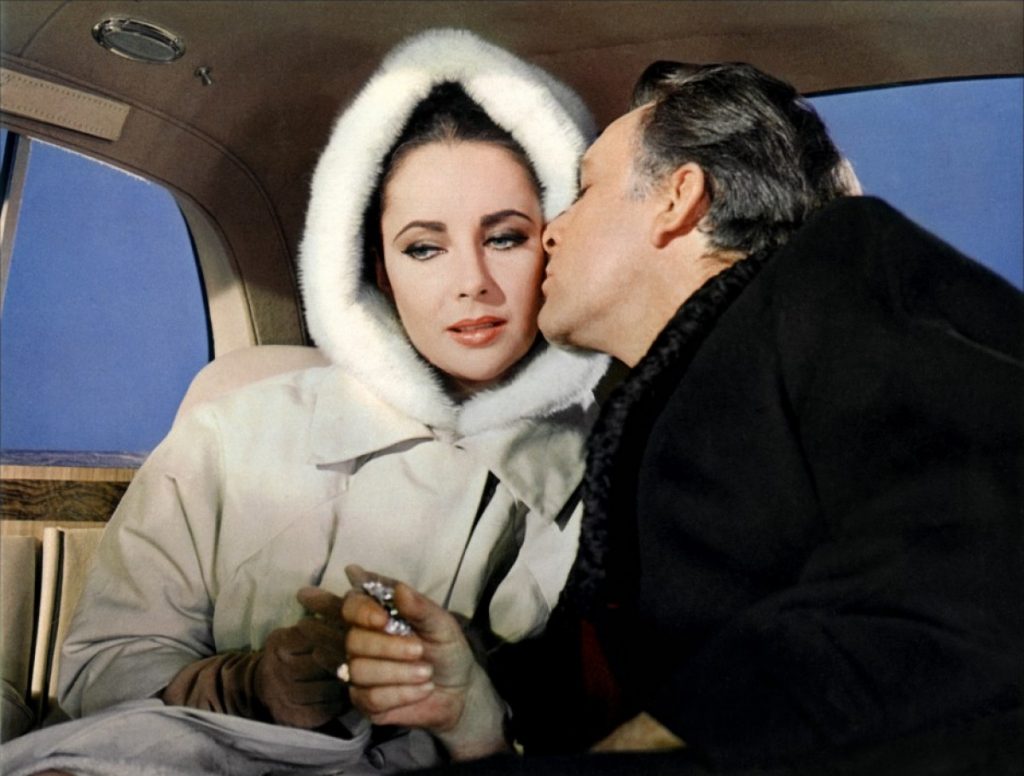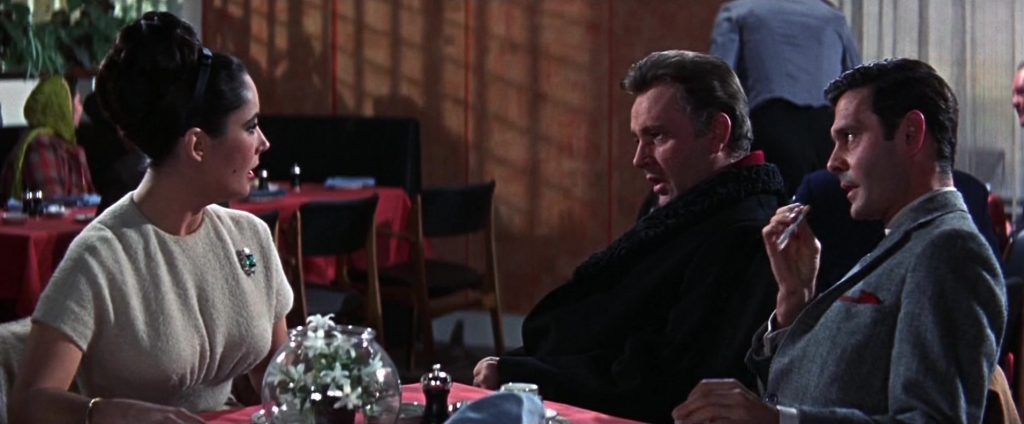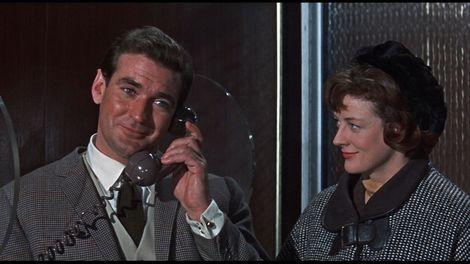
Ensconced in the lobby of Grand Hotel, Dr. Otternschlag famously observes: “People coming, going. Nothing ever happens.” The joke is of course that he’s wrong. The V.I.P.s is filled with people coming and going, specifically a group of passengers at a London airport en route to the US. We witness one tumultuous day in their lives: a predictable yet irresistible soap-opera of a ride.
The travellers are each at a metaphorical as well as literal crossroads. Socialite Frances Andros (Elizabeth Taylor) is abandoning her husband, wealthy industrialist Paul Andros (Richard Burton), to elope with Marc Champselle (Louis Jourdan), a notorious playboy. Businessman Les Mangrum (Rod Taylor) is on his way to New York to try to rescue his company from a hostile takeover. The Duchess of Brighton (Margaret Rutherford) is taking up a job in a hotel that might save her estate. And director Max Buda (Orson Welles), currently in between films, is dashing out of the UK to avoid triggering a massive tax bill. Then a fog grounds all flights, stranding the passengers in London.
Sanders (Richard Wattis), a BOAC functionary, welcomes Buda to the airport with careful praise: his latest film was not only enjoyable, it also made lots of money. “Money, money, money,” Buda replies dismissively. “I never concern myself with these matters.” He’s lying.
The V.I.P.s is all about money. Who has it, who wants it and who needs it.
Even the love triangle tilts around money. Paul surprises Frances with a platinum bracelet and watches her so intently you wonder how she can bear the stress of his gaze. The gift is one of their rituals, a sign of his devotion, yet minutes later he can’t remember whether it’s set with sapphires or rubies. He left the choice to his valet and Frances knows it. Paul treats her like an expensive ornament whose only purpose is to glisten and shine and make other men envious. Marc is a penniless ex-gigolo, but at least he loves her for herself.
After Paul discovers the affair, he reappears like a spectre at the feast and offers a solution: money. Marc points at Andros’ chequebook and tells him that’s how he lost his wife. For all his self-deprecation, love has given the ladykiller a soul. What good is Andros’ money in exchange for that?

When The V.I.P.s was released Burton and Taylor were the world’s most talked about couple, and the film capitalises on their relationship. Flipping through a glamour magazine, Paul shows it to his wife and says fondly, “You can’t open one of these without finding you.” I wondered if he was speaking about Frances or Taylor herself. Burton finally decided to divorce his wife during the shoot; the diamond and emerald brooch Taylor wears was his engagement present to her.
Anthony Asquith marshalled an all-star cast for his film and knew exactly how to use them. As Paul’s icy control disintegrates, Burton reveals his rage is actually a mask for fear—panic at losing the woman he worships. Watching him implode is as unnerving as a mountain collapsing in on itself. Marc’s romance leads him into uncharted territory; Jourdan balances his vulnerability with wry humour. The V.I.P.s finally gave Australian Rod Taylor the chance to play one on screen and he runs with it: Mangrum is endearingly down to earth, a self-made man so unpretentious that Sanders initially tries to bar him from the VIP lounge. No one played the befuddled, fundamentally unflappable specimen of Englishwoman with more sweetness than Margaret Rutherford. The Duchess of Brighton won her an Oscar. And the only person having more fun than Rutherford is Orson Welles, who gets to reel off some off Terrence Rattigan’s best lines (“Can someone tell me how it is possible for a telephone line to be disordered by fog?”).
As good as Asquith’s cast is Maggie Smith, as Mangrum’s secretary Miss Mead, is the only one you can’t catch acting. Miss Mead is a model of quiet devotion. She stays by Mangrum’s side even as he hovers close to bankruptcy. In an outburst of feeling, she touches him lightly on the arm and urges him to keep fighting. Shocked by her breach of decorum, she quickly withdraws her hand, hoping he didn’t notice. It’s all perfectly played and over in seconds.
Contemplating the loss of his firm, Mangrum comes close to giving the film a moral. “I suppose people envy us,” he tells Miss Mead. “I wonder if they realise the cost of it all. I don’t mean money. I mean spirit, the kind of emotional cost.” The V.I.P.s insists that being part of the jet-set is difficult: an emotionally as well as fiscally draining existence, and often a precarious one. Yet the film is so glamorous and frothy, I doubt either Asquith or Rattigan took those sentiments too seriously. And I don’t think the audience is meant to either. All that money can buy can be very good indeed.

Leave a Reply